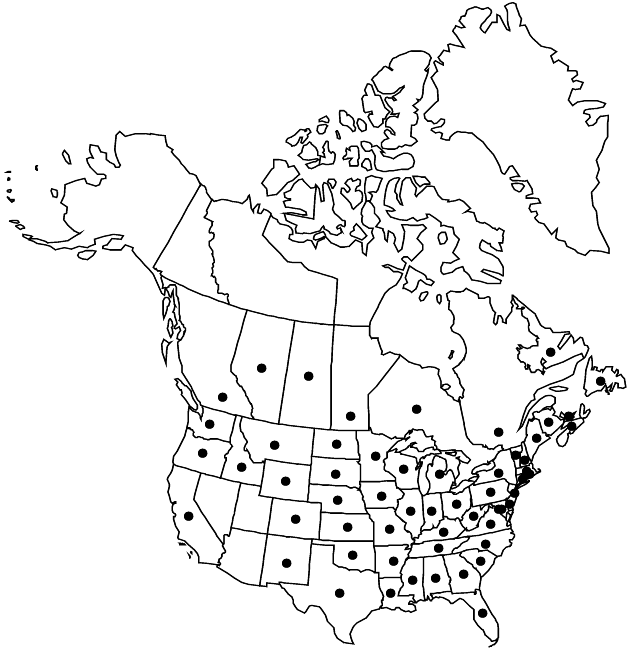Difference between revisions of "Erigeron strigosus"
Sp. Pl. 3: 1956. 1803.
imported>Volume Importer |
RevisionBot (talk | contribs) m (Bot: Adding category Revised Since Print) |
||
| (2 intermediate revisions by 2 users not shown) | |||
| Line 79: | Line 79: | ||
|publication year=1803 | |publication year=1803 | ||
|special status=Endemic | |special status=Endemic | ||
| − | |source xml=https:// | + | |source xml=https://bitbucket.org/aafc-mbb/fna-data-curation/src/2e0870ddd59836b60bcf96646a41e87ea5a5943a/coarse_grained_fna_xml/V19-20-21/V20_794.xml |
|tribe=Asteraceae tribe Astereae | |tribe=Asteraceae tribe Astereae | ||
|genus=Erigeron | |genus=Erigeron | ||
| Line 85: | Line 85: | ||
}}<!-- | }}<!-- | ||
| − | -->[[Category:Treatment]][[Category:Erigeron]] | + | --> |
| + | |||
| + | [[Category:Treatment]] | ||
| + | [[Category:Erigeron]] | ||
| + | [[Category:Revised Since Print]] | ||
Latest revision as of 18:22, 6 November 2020
Annuals, biennials, or short-lived perennials, 30–70 cm; fibrous-rooted, caudices simple, sometimes lignescent, sometimes producing rhizomes that bear leaf tufts at upturned ends. Stems erect or ascending, sparsely to moderately strigose to strigillose or hirsuto-strigillose (hairs usually ascending, rarely spreading, 0.1–1.2 mm), eglandular. Leaves basal (usually persistent through flowering) and cauline; basal blades spatulate to broadly or narrowly oblanceolate to linear, (10–)30–150(–170) × 5–15(–21) mm, cauline usually gradually reduced distally, continuing to near heads, margins entire or shallowly to deeply serrate or crenate, faces glabrous or glabrate to sparsely strigose or strigoso-hirsute, eglandular. Heads 10–200+ in loosely corymbiform to paniculiform-corymbiform arrays (on distal branches). Involucres (2–)3–4 × 5–12 mm. Phyllaries in 2–4 series, glabrous, strigose, or sparsely hirsute, sometimes minutely glandular. Ray florets 50–100; corollas white, less commonly pinkish or bluish, 4–6 mm, laminae coiling. Disc corollas 1.5–2.5 mm (throats sometimes slightly indurate and inflated). Cypselae (0.5–)0.9–1.2 mm, 2-nerved, faces sparsely strigose; pappi: outer crowns of setae or scales, inner 0 (rays) or of 8–15 bristles (disc).
Distribution

Alta., B.C., Man., N.B., N.S., Nfld. and Labr. (Nfld.), Ont., P.E.I., Que., Sask., Ala., Ark., Calif., Colo., Conn., D.C., Del., Fla., Ga., Idaho, Ill., Ind., Iowa, Kans., Ky., La., Maine, Mass., Md., Mich., Minn., Miss., Mo., Mont., N.C., N.Dak., N.H., N.J., N.Mex., N.Y., Nebr., Ohio, Okla., Oreg., Pa., R.I., S.C., S.Dak., Tenn., Tex., Va., Vt., W.Va., Wash., Wis., Wyo., introduced in Europe, Pacific Islands (Hawaii).
Discussion
Varieties 4 (4 in the flora).
Selected References
None.
Lower Taxa
Key
| 1 | Phyllary hairs flattened, 0.5–1.2 mm; stem hairs appressed to spreading, 0.5–1 mm | Erigeron strigosus var. septentrionalis |
| 1 | Phyllary hairs terete, mostly 0.1–0.5 mm; stem hairs appressed to ascending, 0.1–0.4(–0.8) mm | > 2 |
| 2 | Annual or rarely biennial, without rhizomes; various habitats, often ruderal | Erigeron strigosus var. strigosus |
| 2 | Plants usually perennial (sometimes killed prematurely by severe drought), with rhizomes that bear overwintering leaf tufts at upturned ends; shallow soils over calcareous rock | > 3 |
| 3 | Basal leaves linear to linear-oblanceolate, 1–3.5(–6) mm wide; cauline leaf faces sparsely to moderately strigillose | Erigeron strigosus var. dolomiticola |
| 3 | Basal leaves oblanceolate to narrowly obovate or spatulate, (3.2–)3.8–15(–21) mm wide; cauline leaf faces glabrous, margins and midveins ciliate | Erigeron strigosus var. calcicola |